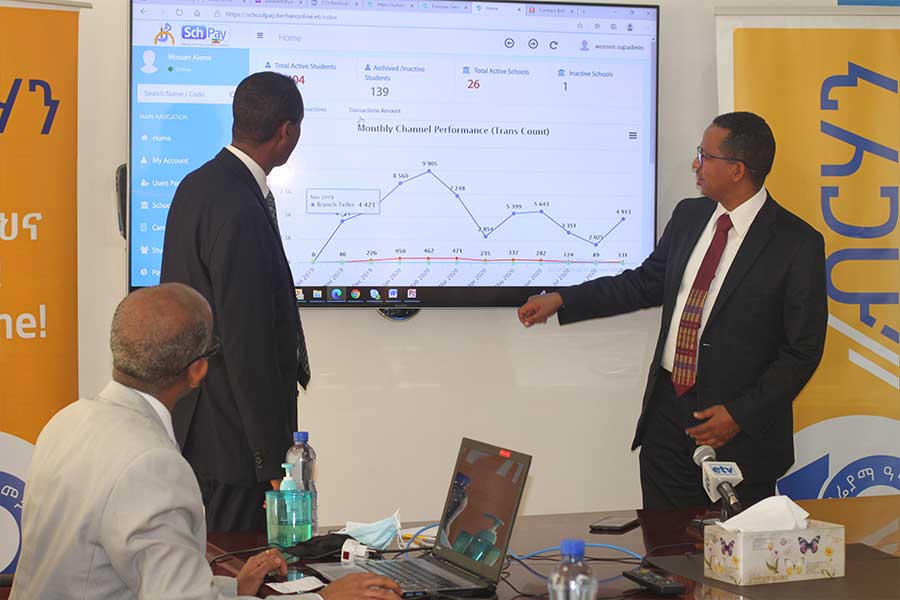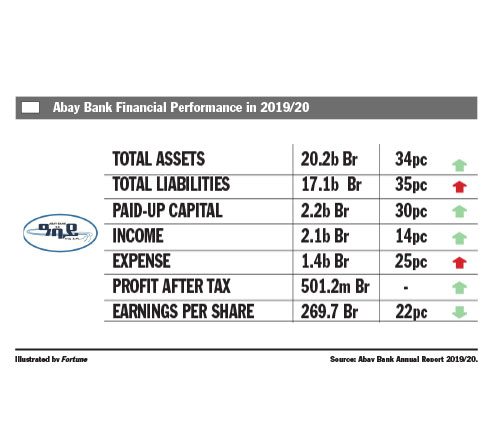
Commentaries | Nov 30,2019
Zemen Bank is set to launch its new mobile banking application, which will enable individuals and corporate customers to transfer payments and check balances, in early February 2021.
The mobile banking solution and a planned series of upgrades of the Bank's digital platforms are under development by CR2, an Irish-owned banking software provider working with Zemen for the past decade in developing its card and internet banking systems. CR2, which operates in Africa, the Middle East and Asia, has previously developed the Amole mobile banking app for Dashen Bank.
Awarded last March, experts of CR2 have been working with Zemen remotely due to the Novel Coronavirus (COVID-19) pandemic in order not to affect the original schedule of the project. The executives of the Bank declined to disclose the project value or the payment made to CR2.
Part of this rollout is aimed at revitalising Zemen's card and internet banking solutions, according to Amha Tadesse, vice president in charge of IT at the Bank, which has 10,559 internet banking users, a 12pc climb from the 2018/19 fiscal year.
"The project aims to create an omnipresent digital banking experience that allows customers to access services through its digital outlet," he said. "In doing so, the Bank wants to avail all of its front desk services digitally."
A customer who wants to order or cancel an Automated Teller Machine (ATM) card should be able to do so through the mobile app, according to Amha.
"Smartphone use and internet connectivity have been increasing, and our client base fits into that segment," said Amha, elaborating on the growing demand for digital banking services among Zemen's customers.
The Bank's mobile banking service is currently provided through Unstructured Supplementary Service Data (USSD) technology, which Amha says is considered an outdated system that needs to be supplemented with modern mobile banking solutions.
Nebiat Tekle, an expert in digital banking with 11 years of experience, points out the reservations that Ethiopian banks have in allowing digital integration.
"Banks need to have the appetite to develop features with Application Programming Interface (API) integrability," he said.
APIs are computer programmes that allow multiple software programmes to interact with one another. Development of APIs by Ethiopian banks would allow, for example, e-commerce platforms to easily integrate mobile payment services.
Nebiat suggests that Zemen develop a multi-purpose app with an appealing and easy-to-use user interface and experience while ensuring tight security protocols.
The expert also noted that the banking industry, especially when it comes to technological products, does not collaborate with local vendors. He explains that there could be two primary reasons for this. Developing a core banking system with a plethora of modules requires massive investments that Ethiopian private investors do not want to indulge in. He suggests that the government or the banks themselves take the lead.
The second reason he mentions is that even though local developers can build affordable and high-quality digital systems and apps in terms of looks, the products lack adequate security features. This explains why almost all Ethiopian banks are using core banking systems and banking solutions developed by well-known global companies, according to the expert.
These apps' usability is another concern, considering the limited mobile and internet network penetration in the country. Nebiat confirms the potential user base of these mobile apps is low in number. Still, he suspects that usage of these digital services will spike with the implementation of new laws and regulations, such as the one that restricts people from directly depositing cash into someone else's account.
"The investment is huge, and the usability is low," he said. "Nonetheless, these apps have got to be developed; that's the only way to move forward."
Nebiat also believes that inter-banking features are much needed, as customers are otherwise put in the difficult position of opening accounts at multiple banks to conduct transactions. He suggests that Zemen Bank also consider integrating a bank-to-bank transfer option on its new platform.
Last week, Zemen, which grossed 1.1 Billion Br in profit last year, a 57pc increase from the previous year, hired PricewaterhouseCoopers East Africa (PwC) to design a five-year strategic plan and a 10-year strategic road map.
PUBLISHED ON
Dec 26,2020 [ VOL
21 , NO
1078]

Commentaries | Nov 30,2019

Editorial | Jun 29,2024

Fortune News | Mar 05,2022

Radar | Sep 27,2025

Fortune News | Feb 15,2020

Fortune News | Sep 11,2020

Radar | Jun 18,2022

Advertorials | Sep 13,2021

Fortune News | Apr 10,2021

Fortune News | Sep 14,2019

Dec 22 , 2024 . By TIZITA SHEWAFERAW
Charged with transforming colossal state-owned enterprises into modern and competitiv...

Aug 18 , 2024 . By AKSAH ITALO
Although predictable Yonas Zerihun's job in the ride-hailing service is not immune to...

Jul 28 , 2024 . By TIZITA SHEWAFERAW
Unhabitual, perhaps too many, Samuel Gebreyohannes, 38, used to occasionally enjoy a couple of beers at breakfast. However, he recently swit...

Jul 13 , 2024 . By AKSAH ITALO
Investors who rely on tractors, trucks, and field vehicles for commuting, transporting commodities, and f...

Nov 1 , 2025
The National Bank of Ethiopia (NBE) issued a statement two weeks ago that appeared to...

Oct 25 , 2025
The regulatory machinery is on overdrive. In only two years, no fewer than 35 new pro...

Oct 18 , 2025
The political establishment, notably the ruling party and its top brass, has become p...

Oct 11 , 2025
Ladislas Farago, a roving Associated Press (AP) correspondent, arrived in Ethiopia in...